Born in Saint Paul, Minnesota, in 1933, John Morrison attended the University of New Mexico on a U.S. Navy ROTC scholarship before going to Oxford to take the BA in Jurisprudence. After a period serving in the Navy, he studied at Harvard Law School and then took up a career in the law at Kirkland & Ellis in Chicago, specialising in antitrust law. From 1998 to 2006, Morrison was President of the Association of American Rhodes Scholars (AARS). He continues to be involved with the AARS as president emeritus and to serve the cause of the Rhodes Scholarship in many invaluable ways. This narrative is excerpted from interviews with the Rhodes Trust in late 2023 and early 2024.
John Morrison
New Mexico & University 1955
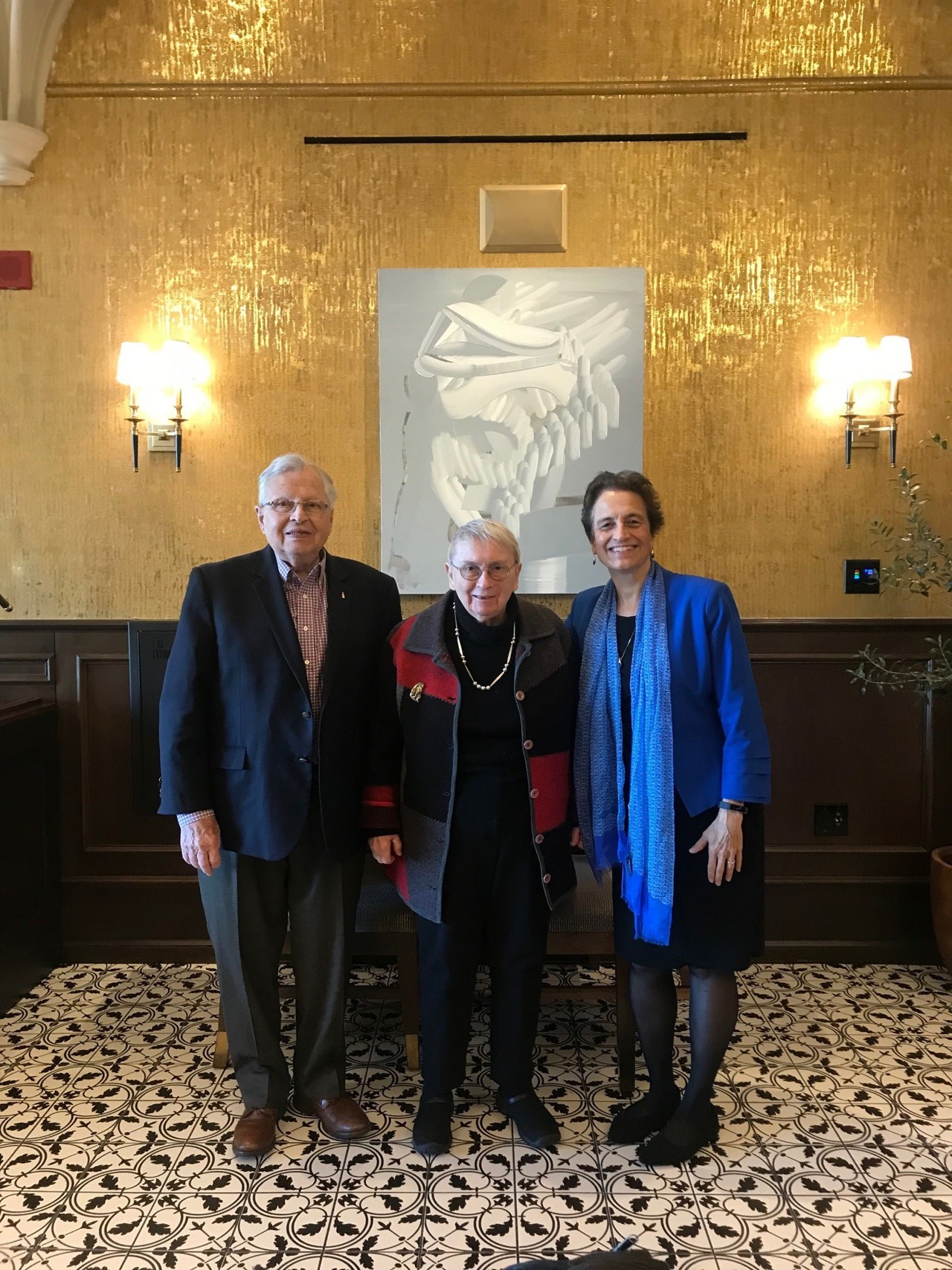
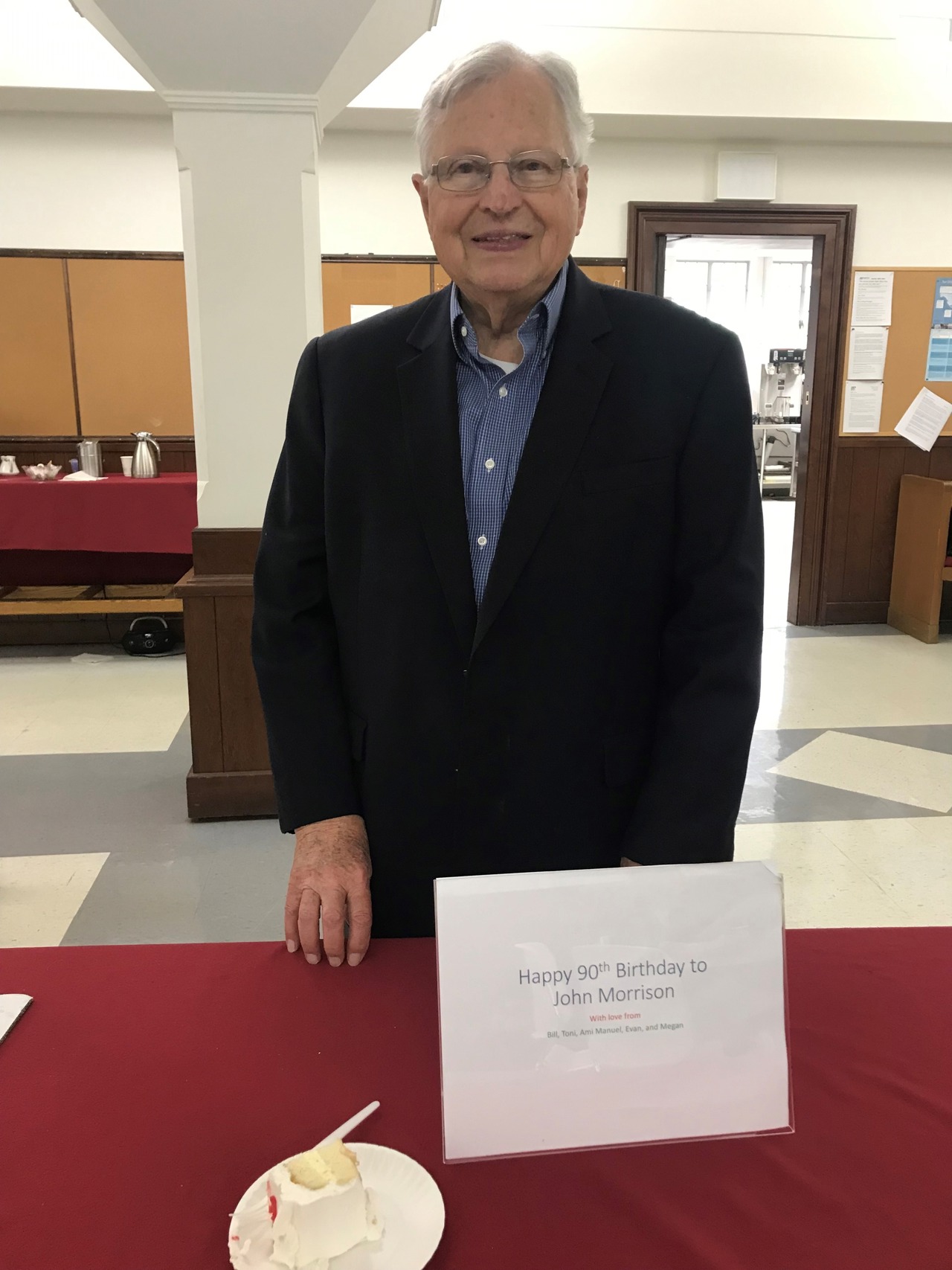
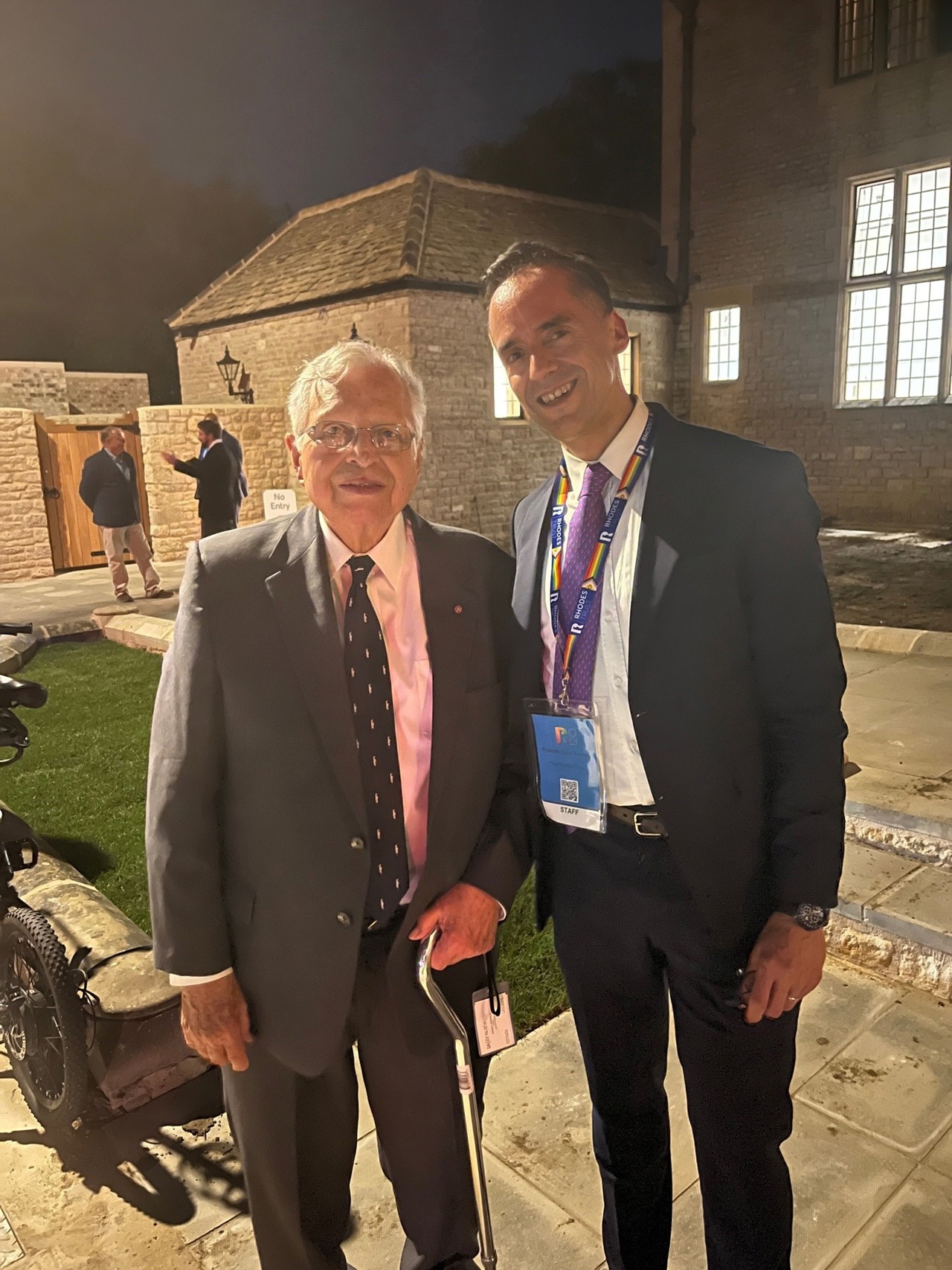
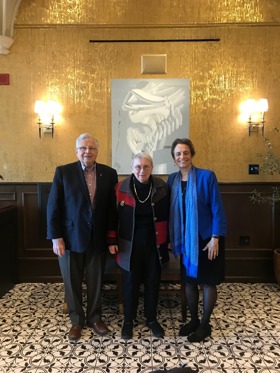
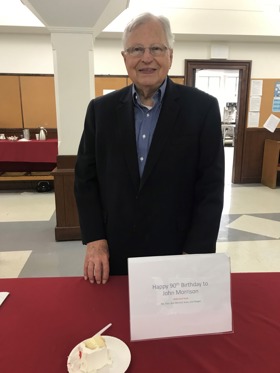

My father always felt the disappointment of not being able to complete law school
A good part of my childhood, my early elementary school years, was spent in the Twin Cities. Then, when I was nine, we moved to Sheboygan, Wisconsin, for my father’s job and that was where I went to school from the fourth grade to the end of high school. Thanks to excellent teachers, I was the 1951 class valedictorian. I was able to do four years of Latin in high school which was very useful later, as it allowed me to study Roman Law as part of my Jurisprudence degree at Oxford.
My father and mother met at the University of Minnesota in the mid-1920s. My father started law school there, but he had to leave, as there was no family money for tuition in those Depression years. I’m pretty sure that’s partly what influenced my desire to be a lawyer; he always felt the disappointment of not being able to complete law school.
In my last year at high school, I won a Navy ROTC scholarship. That scholarship provided every penny of my college education, with the requirement of three years of active duty after graduation. I had been accepted as an undergraduate at Yale, Princeton and Dartmouth, but it was much harder to be accepted to the Navy ROTC units at those universities. My list of preferences had to be matched to available vacancies, and that is what brought me to the University of New Mexico. I absolutely loved getting acquainted with the Southwest. I joined the Sigma Chi fraternity and ultimately was the chapter president. Those years were very important for me in many respects. I still have significant contact with classmates and with the University.
On applying for the Rhodes Scholarship
A close friend of mine at the University of New Mexico, Al Utton (New Mexico & Hertford 1953), had won a Rhodes Scholarship. He was the one who introduced me to the idea and encouraged me. I applied and was interviewed at Caltech in the Athenaeum, the faculty club there. The room was somewhat foreboding, with the candidate in a big wingback chair facing the seven district committee members. The announcement was made in alphabetical order. There were four of us who were successful. Mine was the final name to be announced. It was a memorable situation.
Most of the 1955 U.S. Rhodes Scholars sailed across the Atlantic together. There weren’t any structured activities to help us get to know one another, but we managed to get very well acquainted. We landed at Southampton where we were met by Bill Williams, then Warden of Rhodes House. By the time the coach reached Oxford, it was completely dark. In those days, the only entrance to my college, Univ, was through the porters’ lodge. To get to my room in Durham Buildings, the porter and I had to go through two quads, up a stairway, over Logic Lane, down a stairway, onto Logic Lane itself and then up another stairway into Durham Buildings. My rooms were very old and very cold, so I wore lots of layers and managed to get along quite well. I do remember that there was a water heater on the wall above my very small washbasin, which was extremely convenient.
You didn’t dare get sick!
I did the BA in Jurisprudence. Like other BAs, it was a three-year programme, but the first year was waived if you already had an undergraduate degree. That meant you had five terms to study eight papers, because the sixth term was for revision. Then you took eight papers at the Examination Schools within one week. You didn’t dare get sick! Univ had one of the best college law libraries because of the Master, Arthur Goodhart. He was an academic lawyer and had come from the U.S., so the college law library had more of the American law reports alongside the English ones. We also were lucky at Univ to have a very good law society, the Eldon Society, which held moot courts. I was an officer of the Oxford University Law Society in my second year.
Oxford and England were still very austere in 1955. It was not so long after end of World War Two. We had most of our meals in hall in college. There was certainly nothing exciting about college food. Rationing had only just ended. We had a lot of what was called “brown soup”, many Brussels sprouts and potatoes, and not much meat. There was good beer from the college cellar which we were allowed to take into the dining hall. Sometimes, small groups of us would go for meals to restaurants in Oxford. It was amazingly inexpensive – a pound was worth around four dollars.
We also had the chance to travel a good deal in Europe. I sometimes went with two others who had been selected with me from the Southwestern district – Arthur Hayes (California & Lincoln 1955) and David Maxwell (California & Magdalen 1955). We spent Christmas week 1955 in Rome and then travelled on to Innsbruck and Vienna. In Spring 1956, I visited Copenhagen, Stockholm and Helsinki prior to flying into Berlin, which at that time was still under occupation by the four powers. This was before the Wall went up, so I took the U-Bahn to visit East Berlin, much of which was still in ruins. In Summer 1956 I travelled extensively with a variety of friends by train to Istanbul and then by air to Athens before returning to Oxford. In 1957 I finally saw more of the U.K., with visits to the north and west of England and to Scotland and Ireland.
'I like to think I serve as the institutional memory'
After Oxford, the first thing that life brought me was three years in the U.S. Navy. We worked long days, as I served in two ships. I made long-lasting friendships and had the chance to visit interesting places including Hawaii, New Zealand and the western Pacific. I knew before I finished my term of service that I had been accepted into Harvard Law School. In 1960, I entered the second year there, because if you had the Oxford BA in Jurisprudence you received a waiver for the first year.
After Harvard, I came to Chicago and began work at Kirkland & Ellis, where I remained for 37 years until I retired in early1999 at age 65. The focus of my legal work was antitrust law.
That was the era of price-fixing conspiracies. My first case was a criminal antitrust case involving paper companies in Michigan. I went on to represent a number of large clients, including General Motors, Standard Oil of Indiana (later Amoco) and Firestone. Throughout the 1970s I represented Pfizer in cases that went all the way to the Supreme Court. In the 1980s I was one of the principal lawyers for Weyerhaeuser in paper conspiracy cases. During those early years, my wife, Barbara, and I were privileged to have our three daughters. We now have seven grandchildren.
From 1998 to 2006, I was President of the Association of American Rhodes Scholars (AARS). We reinvigorated the AARS to a substantial degree. Among other things, my predecessor Robert Edge (Georgia & Oriel 1960) had begun in 1985 what has become our Bon Voyage Weekend, then called Sailing weekend, which gave new Scholars from the U.S. the chance to meet and get to know each other and about the Rhodes Trust. We also started our publication, The American Rhodes Scholar, which pulls together information about the Rhodes Scholars-Elect for each year. Now, I’m honoured to have been made President Emeritus, and I like to think I help with institutional memory for the Board.
Never forget your colleagues and contemporaries
It’s been a great privilege for me to be so involved with the Rhodes Scholarships. My love for the Scholarships still motivates and inspires me. I’ve had the chance to meet so many wonderful people. In 2015, I was one of the first awardees of the George Parkin Service Award that recognises contributions made by members of the Rhodes community.
I was also in the very first group appointed in the 1990s by the University of Oxford as a Distinguished Friend of Oxford. I was very involved with the University of Oxford’s initial fundraising campaigns in the U.S. For fifty years, I organised and chaired the Oxford-Cambridge Boat Race Dining Club in Chicago where we’ve hosted distinguished guests from both universities. I will always be proud that in 1994 Queen Elizabeth II appointed me an Officer of the Order of the British Empire (OBE) “for services to the Universities.”
As we conclude this conversation, I do want to recommended Rhodes reunions. Barbara and I enjoyed our class of 1955 reunions which sustained friendships over the many years. The larger reunions, too, have been wonderful: in 1965 at Swarthmore College and later in Oxford and at Georgetown, then the beautiful dual Centenary in Cape Town, London and Oxford, the North American reunion at Penn, and most recently the 120th anniversary of the Scholarships in Oxford in 2023.
To those taking up the Scholarship now, I would say never forget your colleagues and contemporaries. They will become lifelong friends and will enhance your life. Also, do take the opportunity to really get to know the U.K. It has so much to offer. Please join the Association of American Rhodes Scholars! These are exciting times, with Rhodes Scholars prominently involved globally in many aspects of what is happening now, the world’s fight.
